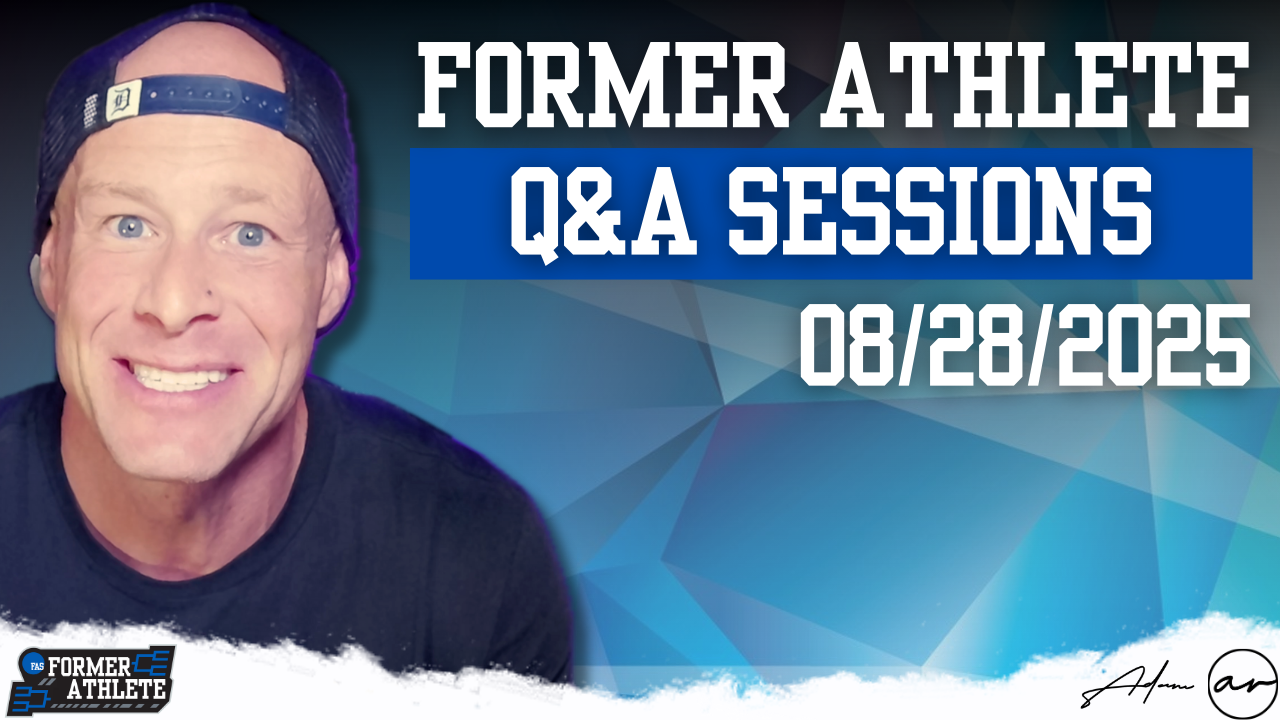5 High-Performance Health Hacks for Cold Season, Longevity, and Muscle Gains | Former Athlete Society
From cold-season defense to blood work, creatine, fiber, and goal-focused training, this post breaks down 5 key strategies for former athletes to stay healthy, strong, and aligned with their performance goals long after their competitive careers.

I just dropped a new video covering all 5 of these high-performance hacks. Don’t miss it.
As the seasons change, so do the challenges that athletes and everyday people face in staying healthy, strong, and focused. From avoiding colds to maximizing muscle growth, the right strategies make the difference between being reactive and being prepared. Here are five powerful questions I answered recently, each addressing a key area of health and performance.
Welcome to a detailed Former Athlete Society Q&A. This episode answers five questions I hear repeatedly from people transitioning from competitive sport to performance-focused life:

Here’s what I'm covering...
1. Cold Season Defense
Every year, we all know that one teammate or coworker who gets sick and suddenly the whole environment feels like a Petri dish. I take a proactive approach to this by borrowing strategies from Andrew Huberman’s work — things like Vitamin D, zinc, NAC, quality sleep, sauna, and stress management. It’s not about overloading on supplements but about stacking the right habits that create resiliency in the immune system. Cold season doesn’t have to derail your training if you’re disciplined about recovery, lifestyle, and preventive care.
2. Blood Work as the Canary
One of the biggest game-changers for me has been taking Peter Attia’s advice seriously: get your blood work done consistently. It’s the canary in the coal mine — showing you small, subtle problems before they become big ones. I’m talking about lipids like LDL and apoB, fasting glucose, liver enzymes, inflammatory markers, and vitamin levels. If you want to invest in your future self, blood work is the cheapest insurance you can buy. It gives you objective truth in a world full of subjective feelings. Without it, you’re just guessing.
3. Creatine for Focus and Cognition
For years, creatine was seen as a “meathead supplement” only useful for powerlifters or sprinters. But more recent research is flipping that idea on its head. Creatine actually plays a key role in energy metabolism in the brain. That means it can improve focus, attention, and resilience when you’re mentally fatigued. Some studies even show promise in supporting people under high stress or cognitive decline. So yes — creatine will help you squat more weight, but it might also help you lock in during a long workday, tough exam, or high-stakes performance.
4. Fiber Intake for Athletes in the Off-Season
Fiber is one of those things that’s easy to overlook when calories are high. Athletes in a mass-building or off-season phase often focus so much on protein, carbs, and total calories that fiber quietly gets pushed aside. But the truth is, fiber supports gut health, reduces inflammation, and stabilizes digestion — all of which affect recovery and performance. The trick isn’t to overload on powders or supplements, but to stay consistent with whole food sources like vegetables, fruit, beans, and oats. Think of it as performance insurance that keeps your system running clean even when you’re pushing food intake higher.
5. Matching Training to Muscle Gain Goals
This might be the most common pitfall I see. People want it all at once — the work capacity of a CrossFitter, the power of an Olympic lifter, the strength of a powerlifter, and the physique of a bodybuilder. The problem? Each of those goals demands a different training approach. If your main goal is muscle hypertrophy, then your training should look more like bodybuilding — progressive overload, focused rep ranges, time under tension. If you want power, you’ll need Olympic lifting. If you want work capacity, it’s CrossFit or Hyrox. But the key lesson is this: you can’t chase five rabbits and expect to catch one. Training must match your #1 goal, otherwise you’ll spin your wheels forever.
Final Thought
The overlap between health, performance, and longevity isn’t always clean, but these five topics show where small shifts can have massive impact. Defending yourself during cold season, being proactive with blood work, leveraging supplements like creatine, prioritizing fiber intake, and aligning training with actual goals are all strategies that set the foundation for long-term success. The former-athlete lifestyle is about more than what happens in the gym — it’s about being deliberate, disciplined, and aligned with the bigger picture.

All of These Questions were Answered!
During our LIVE YouTube Q&A Session but you MUST be a member to access the exclusive behind the scenes content and information!
Join the Society to WatchWant to talk more? Join the Former Athlete Society at AdamRingler.com to submit questions and get early access to future Q&As. Drop your follow-up question in the Society thread and we’ll make the next session even more practical.
